Anatomy of an Era: Mary Lyn Wininger, Part 2
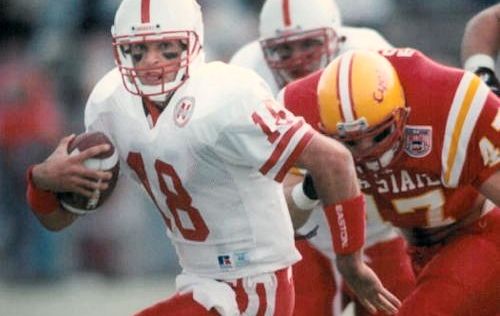
Excerpted from Chapter 52, No Place Like Nebraska: Anatomy of an Era, Vol. 1 by Paul Koch
Anatomy of an Era: Mary Lyn Wininger, Part 2
Q: What time did you usually begin your workday?
MLW: It was usually 8 o’clock in the morning and sometimes we had summer hours, 7:30-ish or whatever. And then it always wasn’t a regular end of the day at a certain time. If there was work to be done you did it. You did it, and that happened a lot with football and the different seasons, but you enjoyed it. It was the coaches who stayed so many hours above and beyond what we did as a staff. We really couldn’t complain, because look what they did. It was, ‘Okay, I can do this.’ But it was fun.
And one thing I appreciated, too, was the openness of it. I remember that we were allowed to go over and lift weights in the weightroom, in the “Weenie Lane,” we called it. (laughs) It was the room in the back that had the little weights, and we always felt special because we felt they were for us, where we’d take all the weights off and just lift the bar. We felt it was our own little room where we would come and work out.
Q: That’s too funny. So let’s say it’s in-season: what about those in-season days? Were there not enough hours in the day to get everything done?
MLW: There were a lot of days like that, but you made it happen. Because I did the offense. Joni Duff did defense and I did offense, because Tom was the offensive coordinator. I did, basically, like every day we’d have a practice schedule. And for two-a-days the coaches would all go in and decide what they were going to be doing. (And they started out with a chalkboard and they ended up with the greaseboard.) But anyway, they would write the offense up and the defensive coaches would come in and write the defenses up there. And then myself and Joni would go in there with our laptops and would type them and then we’d print them out for practices and stuff. I got to do that and I got to be involved in putting together the offensive playbook, too. Not that I designed any plays. (laughs)
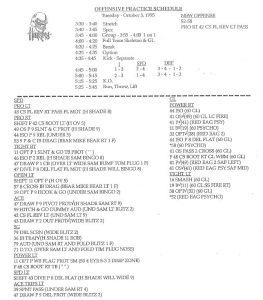
Q: Come on, Mary Lyn, you were the brains behind the Fumblerooskie all this time. Admit it! (laughs)
MLW: I wish I could take credit for that. (laughs) No, I didn’t, but it was fun just to be part of it, because I knew the computer program. They would do the drawings and I would take it and put it in the computer with the little plays and which way they could block and run and the description of the play and stuff like that. So you always felt like you were a part of it. I loved to be behind the scenes, because I’m not a person who likes to get up and do public speaking. Interviews were very hard for me, so don’t put anything ‘dorky’ in the book, okay? (laughs)
And the progam we used to draw the plays up was, I think, called ‘Playmaker.’
Q: Like AutoCAD for football?
MLW: Something like that. And back in the ’90’s, people didn’t use computers that much, especially the guys like Tom there. He was so busy trying to design plays. He’d be working on plays, probably sitting at a restaurant and drawing X’s and O’s on a napkin, and he’d bring them back to me. He didn’t have to bother with that. He was the genius behind the plays and I just felt honored that I could be part of it, you know, and put it in the playbook.
Q: You would actually get napkins from him?
MLW: Well, I didn’t get them at that point, but I did see him doodling. If you ever looked at his deskpad after he was talking on the phone or doing interviews or whatever, there would always be plays on his pad. It just makes sense: he lived and breathed football.
Q: And not to besmirch his reputation, but I always had the feeling that Coach Osborne, if he had his druthers, he wouldn’t even have done media interviews, no? It always seemed as if press conferences and that type of thing were just so far down on his priority list. Would that be true?
MLW: Well, yeah. And that was probably the case just because he felt like he could spend his time better coaching the team, which is what his job was. And when you look at it that way, he’s expected to come up with results and have a great team, and for him to do that you need to be drawing plays, you need to be with your coaches trying to figure out what works and what doesn’t, what players are here and who you need to recruit. There are so many things a coach has to think about.
Q: It’s not just those three hours on the sideline on Saturday…
MLW: Definitely not.
Q: The older I get, Mary Lyn, the more apparent it becomes to me that to be at the apex of one’s profession, like that coaching staff was, you have to have an almost obsessiveness that is beyond most people’s rational thought. Including yourself, I hope this book exposes just how dedicated everyone was to achieve that dominance.
MLW: But I’m such a small little part of that, though. It took a bunch of small, little parts to make it what it was, when you look at it that way.
I even remember they did that documentary thing about Tom and they interviewed the janitor, and Tom had a way of making the janitor feel important. He would talk to them on the way in and out, he just had a way of making everybody feel like part of the team. And I think that’s why he was so successful, because I would have done anything that he had asked, just to try to make it work, you know? Whether it be working hours upon hours, but I think everybody felt that way. The players respected him so much.
Q: Did you sense a servanthood-type of mindset and a selflessness exhibited by Tom in these kids’ lives?
MLW: Yes, exactly. And it was all in a positive way. I just remember he told us the story once about somebody walking along an ocean beach -and I can’t remember it exactly- but a story about all these tiny sea creatures washing up on the sand, like a crab or something like that, and the guy would pick some up one by one and throw them back in. But there were thousands of them along the seashore! And somebody asked the man, “Why do you do this? There are so many of them. Why would it make a difference?” And the man said, “Well, it means all the difference for this one.” I’ve thought about that so often, because he cared about each one, whether it be the ones who were in trouble or the ones that weren’t. He would try to be there for that person. And maybe it’s an endless thing, but if he can help this one here and that one there, you know? I thought that really meant something, about making a difference for just that one. It says something about him.
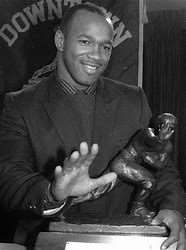
Q: And I’m sure along with that mindset came the frustration of going into the living rooms of some kids throughout the years, kids who were in abhorrent conditions like the nastier, drug- and gang-infested, inner-city environments, and seeing how you could completely turn some kid’s life around by persuading him to come to a place like Nebraska, only to lose them to another school that may not have had that type of fostering attitude. Do you think that made those ‘fish that got away’ occasions that much more painful to him on a personal level?
MLW: Yeah, because you feel like you could be there for them. And he was involved in the Fellowship of Christian Athletes and we’d do so many chapel services, like every time we went to a bowl game that was one of his focuses: a church service on Sunday for the players and the families.
And before each game we would arrange to have chapel service either the morning of the game or the night before, depending on what time the game was, but he definitely tried to instill in them a solid foundation going forward. So he not only taught them football, and the academics come from football, but also show them how important God was in his life and that kind of thing. I always respected him for that, too.
Q: Which brings me to this question: From the first day you worked for Coach Osborne to the last, how would you say he rubbed off on you? Did he rub off on you?
MLW: Oh yeah! I learned so much from him. Just by watching him, he was such a good example in all aspects of what he did.
Q: Any one, specific thing stand out?
MLW: One thing: not only was he a hard worker (which is a great thing to learn, because I do think I learned that a lot from him, and to this day I work hard at what I do. I think a lot of that comes from that), but he took time. And I’ll always appreciate that. You know, Thomas, my son, he was born on Tom’s birthday, February 23rd.
Q: Is it any coincidence his name is Thomas? (laughs)
MLW: No, and that’s the whole thing! There was an article in the paper, this big writeup with my picture in the paper. An Omaha writer, I can’t remember who was the ornery one behind that -it might have been Lee Barfknecht- but Thomas’s great grandfather is Thomas Wininger, and we planned on naming a son Thomas, anyway, and his due date was the 13th of February. Well, anyway, the morning of the 23rd, that day I was going to take a fruit salad to work for Tom for his birthday, because we would always celebrate birthdays (and he ate healthy). Everybody usually brought cake and everything but I was going to bring something healthy, and that morning I realized I wasn’t going to make it to work. I was like, ‘Oh no, of all days!’ I’ll always remember riding on the way to the hospital to give birth and saying, ‘Well, can we stop by the stadium football office to drop the fruit salad off?’ (laughs) Like, ‘Will Tom be able to eat?’ (laughs)
Of course, I didn’t get to do that because I had to get to the hospital. But then Tom and Nancy came that night to the hospital and visited with us on his birthday. And it just meant a lot to me that he would take time out to do something like that. And later he took Thomas fishing and different things like that that I really appreciated, because he wouldn’t have had to have done that. That will always mean a lot for my kids, that he took the time to notice them and come and talk to them.
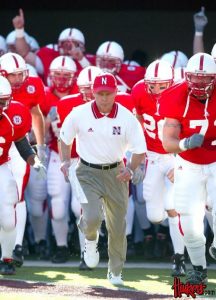
Q: I was going to ask what it was like having two children along with the calamity involved with the job? Did you take a few weeks’ maternity leave or something?
MLW: Yeah, I took the normal six weeks like we could. And I’m sure I came in during that time and did a little work or something, but it almost made you feel guilty to take time off. And I guess I didn’t like that part of it. Tom always kind of joked, “Why do you need six weeks?” (laughs) He used to joke about that.
Q: Kind of like, “Coach, you pop out a football and see if you can come back the next day?” (laughs)
MLW: Exactly. Because you never missed work. Nobody ever seemed to be sick on the coaching staff, because they were always there. I don’t ever remember, other than the time Tom had his open heart surgery he did take a little time off, but not a lot. They just always seemed to be there.
And one time I looked at the days I’d missed, other than giving birth to my two children, and I think it was 3 days in the last 5 years. And Tom remarked about me not being there, and I thought about it for while and came to the realization, ‘Aw, he missed me. (laughs) He really does want me there!’
Q: I’m sure one day of your not being around slowed him down immensely. And I have to say, you were speaking of his propensity to spend time with so many people earlier, which reminds me of a gentleman I know: Alan Roth out in El Cajon, CA, who owned a muffler shop. One day Alan presented me a letter that he’d received from Coach Osborne just a few weeks after the ’94 Orange Bowl loss to Florida State, and in the letter he shared a thank you for the support and how the team played very well but somehow wasn’t able to gain the victory, and how he thought the upcoming year’s team could be a pretty good team, too. Well, it just occurred to me that you were probably the person who typed that letter from Tom’s dictation and sent it! (laughs) Did he always have such an open door policy with fans like he did the players?
MLW: He probably responded to the gentleman’s letter, you’re right. Tom answered those letters, whether it be fan mail or whatever. For the most part we attempted -we tried to answer the correspondence that came in, and some of them obviously were form letters- but it was from him and he would dictate them and I’d type them and send them out. But he felt like that was important. And it is.
You know, the fans were so important to that program, even more so than I realized at the time. But that was part of my job: an enjoyable part of my job was to protect him, and a way of doing that would be when sometimes people would come to the offices with little kids I’d say to them, ‘Would you like to go see the field?’ and I’d take them down there and take a football and they’d throw it around. And just the look on their faces?! I’d even have people come up years later and say, “Remember when you took my son down there?” And I did that so often (and you don’t always remember all of them), but I’d sometimes say, ‘Yeah.’ But I remember taking people down there and it was good public relations for the program… and at the same time was able to allow time for Tom to do his work.
It was kind of the way of making the fans feel like they were a part of it, too. They were able to come up, and we had the National Championship trophies there right outside of Tom’s office, and they could walk up and look at the trophies. It was probably too open. (laughs) I’ve never seen another football office like that. I’d go visit other football offices if I’d go traveling, going in to see what it was like, looking at their setup and trying to get ideas and such. But anyway, these people could come up and just be part of it, and I think that’s why we have such awesome fans, because they truly feel like it’s their team, that they’re a part of it. And they are. Tom has a way of making everybody feel like they are part of the team, like they each have a part to play.
Q: Now, I asked if he rubbed off on you. I have to know if you think you rubbed off on him at all?
MLW: Oh, I doubt it. (laughs) I don’t know if there was anything I could have taught him.
Q: When I recently interviewed him I asked him how he had improved from his early coaching days to his latter ones and his answer was that he’d become a better listener.
MLW: I think he did learn, but not that he learned that from me. That’s interesting he would say that, because I could see that. That makes sense.
Q: I left the question very open-ended for him, too, because he could have talked about the evolution of the spread offense, about some x’s and o’s type of thing, but it was his listening skills that he felt the strongest about. I was extremely taken with his answer.

Both volumes available on Amazon.com
MLW: And he had to do that. I always remember one of those things that I still use to this day -because of the people I work with at my job now- and it was his, “There is always this side of the story and then the other person’s side of the story, and the truth is somewhere in between those two.” And he would say that a lot. He would do a lot of research to get to the bottom of whatever he was working on. He’d repeat that: “The truth is somewhere in between the two.” He did a lot of sorting out of things now and then, with Lawrence and Riley and Tyrone, too.
Q: Were those times really hard on him?
MLW: They were very hard on him, because he cared about them as people and not necessarily as football players, but as a friend. He genuinely cared about each player. And to see somebody struggle like that? It’s hard, because you try to do what you can but sometimes it’s beyond your control. I don’t know the best way to word that, but I just want to get across that he definitely cared about each person and was always trying to make them a better person.
That’s what was so frustrating with the media. It was frustrating to watch what the media would do. They would take little bits and pieces and then it wasn’t always factual, and when people pick up a paper they just assume that it’s all correct, and sometimes those stories didn’t come across as they really were.
Q: That’s very interesting you would say that, Mary Lyn, because it was later on in my education that I finally came to the realization that just because something is in a book doesn’t necessarily mean that it’s true. (laughs) That was an epiphany for me. I guess I was a little naïve to think that anything in print was somehow vetted or verified to be of a truthful nature, you know?
MLW: And a lot of people don’t realize that. And until you really see that, it’s an eye-opening thing. Those players would do something that any other college person would do and not get in trouble for it and not get brought up, but they were in a fishbowl and they had to always set a good example. They were always expected to do that. And for college students, you’ve got to admire them for what they had to go through.
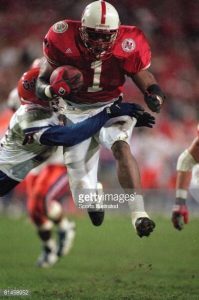
Q: Do you think some of these players often felt pressure because of that, at a mere 17-20 years of age?
MLW: They kind of knew that was expected of them, because if you are an athlete you have all these kids that look up to you, and if you’re recruited you kind of know that that’s what you have to do.
But yet, you’re a college-aged student. And I don’t want it to come across the wrong way, but you do have all the kids that look up to you and the notoriety, as well. So that’s what they knew was expected of them.
Q: In other words, you may get a better seat in a local restaurant, but the flipside is that everybody is going to be watching your every move while you’re in that seat, huh?
MLW: Yeah…
Q: And they’ll be watching to see if you’re a good tipper, too! (laughs)
MLW:(laughs) Exactly. Or coming up and asking for your autograph.
Q: Just when you have a mouthful of Valentino’s Pizza or something?
MLW: Yeah. It always amazed me. You know, Tom used to take us out for Secretary’s Day and that kind of thing, and people would just kind of stare at you. He’d be sitting there with this table of people who worked for him and they’d come up and ask for an autograph as we were sitting there eating. And he’d just sign it and smile. He was just used to it.
Q: Where would you go to eat on occasions like that?
MLW: Oh, it would depend. Different places. We would try different places downtown. He’d usually ask us where we wanted to go and we’d pick different places. It was always something with halfway healthy food if we wanted him to eat with us. Just a variety of places. He was always good about that kind of thing.
To be continued….
Copyright @ 2013 Thermopylae Press. All Rights Reserved.
Photo Credits : Unknown Original Sources/Updates Welcomed